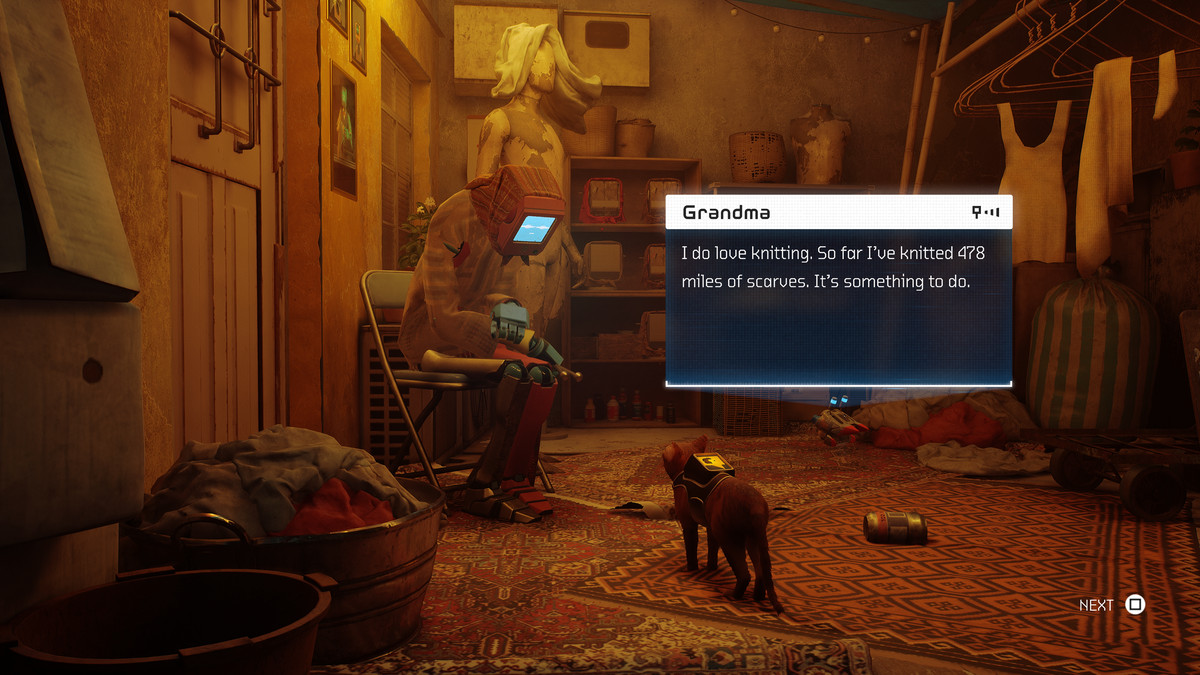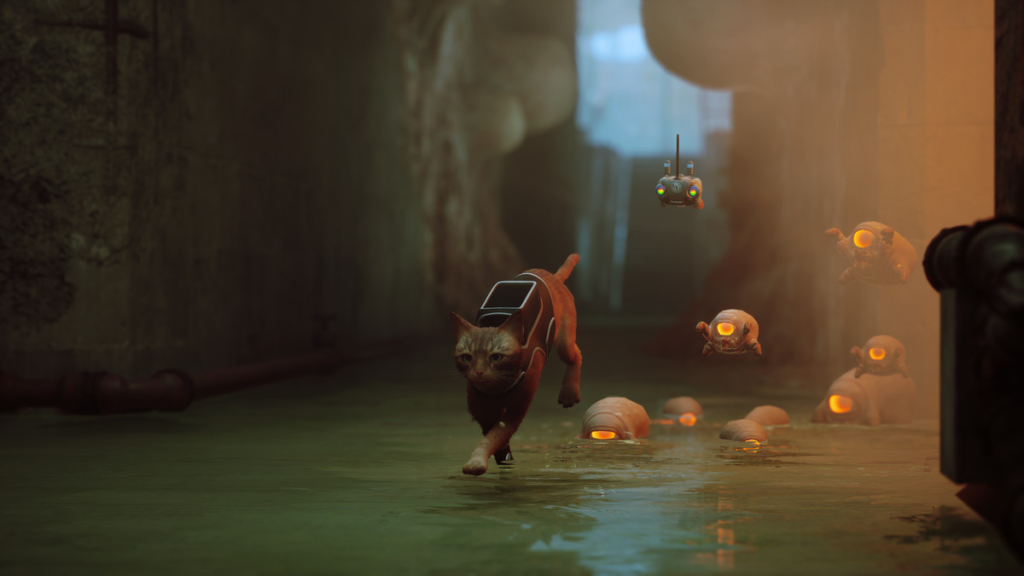Stray has a lot of things in common with other adventure games. You have to solve puzzles, navigate a dense urban environment, and utilize stealth to avoid powerful enemies. There are characters to befriend and things to collect. But there’s one key difference between Stray and its contemporaries: you play as a cat. That may sound like a small twist or even a gimmick, but in reality, the shift in perspective makes Stray feel refreshingly new. You’re still in a big, complex world, but now, you’re seeing it from ground level. It changes everything from the exploration to the puzzles. And, coupled with a bittersweet story that oscillates between joy, heartbreak, and even occasionally horror, it makes for one of the best games of the year so far.
In Stray, you play as a nameless cat that finds itself separated from its feline friends at the outset of the game and plunged into a subterranean world populated by robots instead of people. Initially, the goal is simple: get back to the surface. Quickly though, the quest becomes something more. Eventually you’re joined by a cute drone named B12, and the mysteries of the world start to pile up. On your way to the surface, you rise through the layers of robot society — literally — learning more about not just their lives and history but also just what the heck happened to humans. On top of that are the zurks, a mysterious swarm of bug-like monsters that eat seemingly anything. That includes the robots, which is what keeps the machines restricted to various underground slums, as well as cute little cats.
The story also provides a nice twist on the classic silent protagonist. Unlike, say, Link from The Legend of Zelda, here it makes sense that your hero never talks because, well, it’s a cat. You’re occasionally able to communicate via translation from your drone buddy, but more often than not, Stray is a game where your actions do the talking. You can pander to the robots by doing favors big and small — these can range from helping a robo-grandma knit a cozy poncho out of electrical cords or reuniting a father and son by traversing dangerous, zurk-filled sewers. Stray’s story is relatively short — I finished the game in around seven hours — but it covers a lot in that runtime, with themes ranging from wealth inequality to environmental disaster, not to mention the all-too-important fate of the cat itself.
In terms of how it plays, Stray straddles a few genres, depending on the moment. Much of your time early on is spent figuring out how to get around a very vertical city as a tiny cat. The controls are a little different from a typical third-person adventure: while you can move around freely, the jump button is contextual, so you can only jump when you see an X appear on a ledge. It took me a bit of getting used to — and it can slow things down when your life’s on the line during an action sequence — but it also makes a lot of sense. In Stray, moving around is often a steady process of planning as you plot your course up or down a building or through a treacherous path. It’s a lot like watching a house cat methodically climb furniture and countertops to get to the top of a fridge.
Getting around involves not just planning the proper route but also solving some generally easy to deduce environmental puzzles. These could be as straightforward as knocking down a plank of wood to create a bridge, but, often, they’re more involved, with multiple steps that could require anything from repairing machines to scaring robots with a well-placed meow. (There is a button on the controller dedicated solely to meowing.) This isn’t a straight action game where you have lots of abilities at your disposal. Outside of a brief section of the game, you don’t have a weapon, so all you can really do is run, jump, meow, and perform other context-sensitive actions like scratching a door or batting something off of a shelf. The experience is more about exploring this densely packed world looking for clues and figuring out the best way to proceed given your limited kitty skills. And while some of these actions exist in other games, the sheer fact that you’re a cat, with limited options and a ground-level viewpoint, makes them feel very different in practice.
That said, there are a few action sequences, which, short as they can be, add a necessary dose of tension to the experience. Early on, you’ll be dealing with swarms of the zurks, which means either running away or using a very limited weapon to destroy them. These moments can be terrifying — they’re reminiscent of the deadly swarms of rats in 2019’s A Plague Tale: Innocence — but they can also be frustrating. A few times, I found myself dying repeatedly until I was able to memorize the patterns of the bugs and plot a safe escape. It felt more tedious than grueling, though these moments were rare, and the game has a very generous checkpoint system so that you are never forced to replay large sections. Later on, the action shifts to stealth, as you have to completely avoid robots to infiltrate various places. (This, of course, involves hiding in cardboard boxes.)

You move back and forth between these moments of action and adventure, and perhaps the most impressive thing about Stray is how it’s all paced. It never felt like I was forced to spend too much time on any one thing. As soon as a portion of the game started to feel boring — whether it was running from the zurks or hopping across rooftops — I was able to move on to something else. The same goes for the story. It starts out as a simple quest back home, but as you move up through the various levels of the robot world and learn more about this not-implausible future, the stakes — both personal and existential — become much higher. The ending is beautiful and tragic.
The experience is also full of quiet moments if you want it to be. Stray gives you plenty of time to just be a cat. You can scratch up carpets and couches, make a total mess of an in-progress board game, or lie down on a snoozing bot for as long as you like. These actions are occasionally necessary to solve puzzles, but more often than not, they’re just fun to mess around with and help get you in that cat mindset. The first time the cat puts on its harness is one of the funniest moments I’ve experienced in a game.
Stray lets you linger, but it also doesn’t overstay its welcome. I played through the entire thing in two sittings because I couldn’t put it down: I just had to know what happened next. When you mix that carefully plotted narrative with gameplay that lets you meow on command, you have an experience that scratches an itch I didn’t even know I had.
Stray launches July 19th on the PS4, PS5, and Steam.

